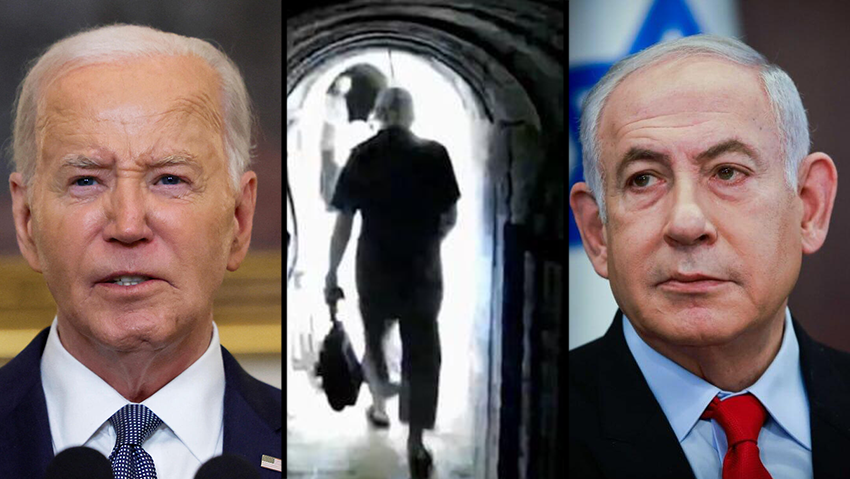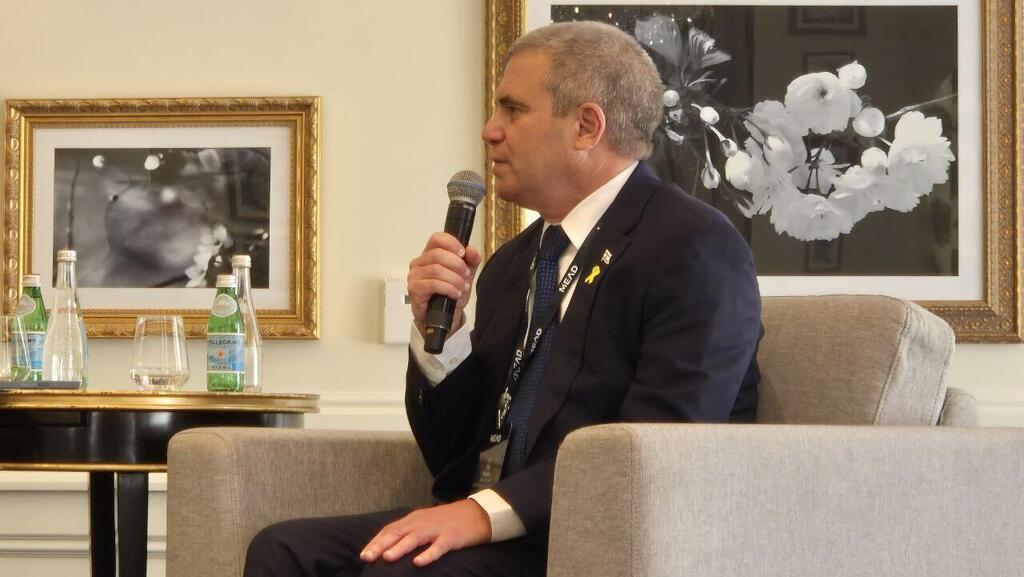Getting your Trinity Audio player ready...
There appears to be stagnation in negotiations with Hamas for a cease-fire and hostage deal, and the Americans are debating whether to put a new outline on the table this week while neither side shows signs of compromise.
Meanwhile, Gal Hirsch, Israel's envoy for hostages and missing citizens, said Sunday at the MEAD conference in Washington, an annual summit to advance the Middle East-America dialogue that Hamas has not really been negotiating in good faith, but that he believes Israel could agree to allow Hamas leaders to leave Gaza if certain conditions are met.
"Hamas is not really negotiating. There is a facade of negotiations. We thought there was progress but unfortunately now there isn't. Hamas wants to exhaust us. From time to time, Sinwar sends instructions and then dozens of Hamas spokesmen say what they want and drive the families crazy. They are just trying to bide their time," Hirsch said.
2 View gallery


President Joe Biden, Hamas leader Yahya Sinwar, Benjamin Netanyahu
(Photo: Haim Goldberg/Flash90, IDF spokesman, Evelyn Hockstein/Reuters)
"Since December, Hamas is not really in the picture. In March they came for a few days to negotiations in Doha and then disappeared," Hirsch said.
"There is a direct connection between the international pressure on Israel and the willingness of Hamas to be a part of negotiations. When they see that Israel is under huge pressure from our best ally or by the UN Security Council or by UN resolutions or by Great Britain they see there is no rush. They do not need to be in a hurry regarding negotiations because the hostages are their only assets."
Hirsch says that Hamas has created the narrative that Israel is the one preventing a potential agreement. "This is a lie. We never intercepted or canceled the deal that was on the table. No, it did not happen. And of course, Hamas is studying and learning more about our society. And so they, they want very much to divide and turn off the Israeli society by using the hostage issue and they see what is happening in Israel," he said.
"The war can be stopped tomorrow. Gaza can be restored. I'm telling you that we want all the hostages back home. Demilitarization, deradicalization. And I can even believe that we will agree to build safe passage, safe passage for them to leave the Gaza Strip," he said.
In Israel it is estimated that the U.S. may put forward a new cease-fire proposal on Tuesday, but until then the Americans may change their mind or postpone the publication of the proposal if they come to the conclusion that the chances of its acceptance are low.
Sources familiar with the negotiations claim that the gaps between Israel and Hamas are very large. According to them, there has recently been progress, but the chain of public statements by Netanyahu regarding the critical importance of the IDF remaining in the Philadelphi Corridor has made it clear that in practice he does not intend to reach phase 2 of the deal - which includes the end of the war. In such a situation, Hamas is unlikely to agree to start the first phase, which would see the release 30 hostages, dead and alive, over a period of 42 days.
The White House has said that the parties agree on some 90% of the points of the proposal, but Israel claims that there is no possibility of reconciliation on the horizon for the last 10%. At the same time, Israel believes that the U.S. should exert greater pressure on Egypt, as the main party responsible for smuggling from the Philadelphi Corridor.
The Americans, for their part, are between a rock and a hard place: The Biden administration believes that Netanyahu is responsible for the explosion of the negotiations, but on the other hand, they do not want to publicly attack him in order to avoid having a negative impact on the Democrats in the 2024 presidential campaign.
At the end of last week, an internal investigation was opened by the IDF to find out who is manipulating classified Hamas documents seized in Gaza - or those that were only allegedly taken from Hamas - and passing them on to the international media in order to try and influence public opinion in Israel on the issue of the hostages deal. The affair is expected to heighten the tension between the security establishment and Netanyahu, which has already reached a new peak following the deep disagreement between the parties surrounding the deal.
Some of the anger is a result of the publication in the German media outlet Bild, which claimed to disclose internal and secret documents that apparently reflect Hamas leader Yahya Sinwar's mindset and strategy but is consistent with the prime minister's position regarding Hamas' refusal of the proposed deal and the escape plan of the organization's senior officials through the Philadelphi Coirridor.
An examination of the document published in Bild revealed that it was not Sinwar's document at all, but rather a proposal by a middle-ranking official in Hamas. And the main part of the document that the newspaper supposedly quotes, which syas Hamas is not interested in the deal, does not actually appear in the document.
"This is a very serious matter," says a military official familiar with the details of the investigation.
"There are systems in the IDF and other intelligence agencies whose job it is to influence the enemy, but according to law it is forbidden to try and operate such an influence system, certainly not with the perfunctory use of classified materials that were not allowed to be distributed to the public at all. This is an influence campaign on the Israeli public. We are not dealing with politics but with a totally wrong move and we are determined to find the person or the party behind it."



